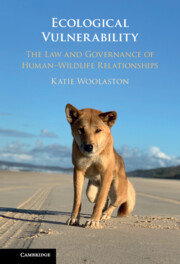Book contents
- Ecological Vulnerability
- Ecological Vulnerability
- Copyright page
- Contents
- Abbreviations
- 1 Introduction
- 2 The Human–Wildlife Relationship
- 3 Friends in the Wild?
- 4 Friends in Law?
- 5 Human–Dingo Conflict on K’gari (Fraser) Island
- 6 Human–Elephant Conflict in Northern Botswana
- 7 Pandemic Vulnerability and Resilience
- 8 Conclusion
- Index
2 - The Human–Wildlife Relationship
An Ecofeminist Approach to Vulnerability Theory
Published online by Cambridge University Press: 09 June 2022
- Ecological Vulnerability
- Ecological Vulnerability
- Copyright page
- Contents
- Abbreviations
- 1 Introduction
- 2 The Human–Wildlife Relationship
- 3 Friends in the Wild?
- 4 Friends in Law?
- 5 Human–Dingo Conflict on K’gari (Fraser) Island
- 6 Human–Elephant Conflict in Northern Botswana
- 7 Pandemic Vulnerability and Resilience
- 8 Conclusion
- Index
Summary
Chapter 2 is a detailed explanation of the theoretical methodology that the remainder of the monograph follows. It begins with an explanation of the main philosophical positions that are traditionally considered as relevant in situations of human–wildlife conflict, including anthropocentric, ecological and animal rights/welfare perspectives. Because the very nature of human–wildlife conflict is centred on differences in held values, these types of value-driven positions are not, by themselves, useful in responding to conflict, because of the alternate value positions that they alienate. The chapter then moves to an analysis of two theories – Martha Fineman’s Vulnerability Theory and Ecofeminism. The purpose of the chapter is to analyse the principles of both sets of theories and combine them to develop a new theory of environmental jurisprudence, which will be referred to as ‘Ecological-Vulnerability’. The chapter demonstrates that an ecofeminist approach to vulnerability theory (eco-vulnerability) not only explains the individual and institutional limitations in current methods of addressing human–wildlife conflict but can help to formulate principles that work to transform it.
Keywords
- Type
- Chapter
- Information
- Ecological VulnerabilityThe Law and Governance of Human–Wildlife Relationships, pp. 13 - 51Publisher: Cambridge University PressPrint publication year: 2022

